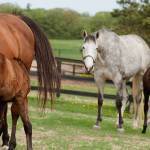Ascarids in Foals: New Treatment Shows Promise

Experts describe the occurrence of ascarid infection among foals as “pervasive.” In short, where there are foals, there are ascarids. Limited treatment options complicate control of ascarids, and those that are available offer negligible efficacy. Because of this, researchers are determined to find alternative ways to combat ascarids, and a recent study has unveiled a promising new treatment.
Two species of ascarids infect horses, Parascaris univalens and Parascaris equorom. While the species are morphologically identical, chromosomal study called karyotyping can differentiate the two. Karyotyping performed over the past several years reveals P. univalens to be the most common species, where once P. equorom was thought to be the most prevalent.
Regardless of the species, foals are affected by ascarids in the same way, with intestinal impaction identified as the most serious effect. In severe cases, foals can harbor thousands of ascarids in the small intestine. Even so, surgical intervention due to ascarid impaction is rare. Because larvae migrate into other organs, body-wide inflammation is also a result of infection. In sum, while ascarid infection among foals is high, morbidity is low.* Nevertheless, due to widespread drug resistance, the importance of developing new deworming formulations remains a priority for parasitologists.
In a recent study, researchers investigated the use of a paraprobiotic in the fight against ascarids.+ A paraprobiotic is a nonviable microbe that confers one or more benefits to an animal when administered orally or topically. These benefits transpire due to interactions between the paraprobiotic and physiological pathways, including those of the immune system.○ In this study, researchers tested the therapeutic ability of a paraprobiotic that expresses the Bacillus thuringiensis Cry5B protein, which is known to be effective against Parascaris species.+
Researchers used 10 foals in this study, all of which were exposed to parasites through contaminated pasture and were therefore naturally infected with ascarids. Foals were not dewormed prior to the study. Fecal egg counts on all foals were performed until they exceeded 100 ascarid eggs per gram. Foals were then placed into pairs. One foal in each pair was given a single dose of the paraprobiotic through a nasogastric tube; the other foal in the pair served as a control. Researchers performed fecal egg counts on the day of the treatment and then weekly for four weeks.
Fecal egg counts fell to zero in all foals treated with the paraprobiotic at one week following treatment and stayed at zero throughout the study, indicating the treatment may “make a significant contribution to the long-term, safe, and effective control of ascarid parasites of humans and other animals,” according to the researchers.
Effective parasite control is one facet of responsible equine husbandry. When left unchecked, chronic parasitism of young and mature horses causes health concerns, including an unthrifty appearance. Of note, parasite-infested horses will frequently have a ribby or pot-bellied appearance and a dull coat even when fed a nutritionally adequate diet.
“Developing an appropriate deworming protocol based on fecal egg counts still remains the best way to avoid damaging infestation in susceptible horses. A veterinarian is the best resource for all parasite-prevention programs,” said Kathleen Crandell, Ph.D., a nutritionist with Kentucky Equine Research.
*Nielsen, M.K., 2016. Evidence-based considerations for control of Parascaris spp. infection in horses. Equine Veterinary Education 28(4)224-231.
○De Almada, C.N., C.N. Almada, R.C.R. Martinez, and A.S. Sant’Ana. 2016. Paraprobiotics: Evidences on their ability to modify biological responses, inactivation methods and perspectives on their application in food. Trends in Food Science and Technology 58:96-114.
+Urban, J.F., M.K. Nielsen, D. Gazzola, Y. Xie, E. Beshah, Y. Han, H. Li, F. Rus, K. Flanagan, A. Draper, S. Vakalapudi, R.W. Li, G.R. Ostroff, and R.V. Aroian. 2021. An inactivated bacterium (paraprobiotic) expressing Bacillus thuringiensis Cry5B as a therapeutic for Ascaris and Parascaris spp. infections in large animals. One Health 12:1000241.








